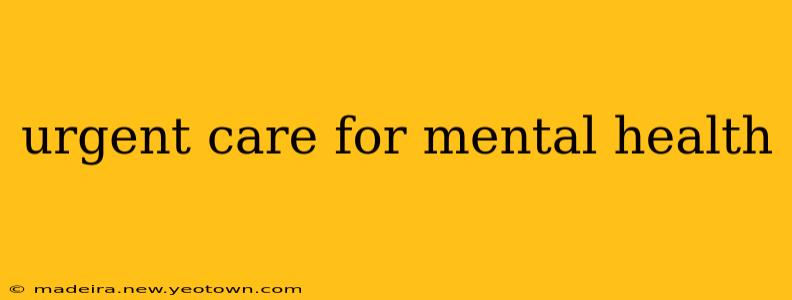The weight of the world can feel unbearable sometimes. A sudden crisis, a debilitating anxiety attack, or the overwhelming pressure of a mental health struggle can leave you feeling lost and desperate for immediate help. But finding the right kind of urgent care for mental health isn't always easy. This journey starts with understanding that seeking help is a sign of strength, not weakness, and that immediate support is available. This guide navigates the landscape of urgent mental healthcare, providing crucial information to help you or a loved one find the care you need, right now.
What Constitutes a Mental Health Emergency?
This is a crucial question, as recognizing the urgency of your situation is the first step towards getting help. A mental health emergency isn't simply feeling down; it's when your mental state poses an immediate risk to yourself or others. This could include:
- Suicidal thoughts or self-harm: Any thoughts or plans of harming yourself require immediate intervention.
- Severe anxiety or panic attacks: Uncontrollable anxiety or panic attacks that interfere with your ability to function or breathe require immediate medical attention.
- Psychotic episodes: Experiencing hallucinations, delusions, or disorganized thinking can indicate a serious mental health crisis.
- Severe depression with suicidal ideation: Intense feelings of hopelessness, worthlessness, and a persistent desire to end your life necessitate urgent professional help.
- Aggressive or violent behavior: If you are feeling overwhelmingly angry and unable to control your impulses, or if your behavior is putting yourself or others at risk, seek immediate help.
Where Can I Find Urgent Mental Health Care?
Finding the right place to turn during a mental health crisis can feel overwhelming. However, several resources are readily available, depending on the severity of your situation and your location:
-
Emergency Room (ER): For life-threatening situations like suicidal ideation or severe self-harm, the ER is your first line of defense. While ERs might not specialize in mental health, they can provide immediate stabilization and connect you with appropriate specialists.
-
Crisis Hotlines: These are invaluable resources offering immediate support and guidance over the phone. They offer a confidential space to discuss your feelings and receive immediate crisis intervention. The National Suicide Prevention Lifeline (988) is a great example, providing 24/7 support.
-
Mobile Crisis Teams: Many communities have mobile crisis teams that can come to your location to provide on-site assessment and intervention. These teams are often composed of mental health professionals who can offer immediate support and develop a safety plan.
-
Urgent Care Clinics with Mental Health Services: Some urgent care clinics are beginning to integrate mental health services into their offerings, providing a more accessible alternative to the ER for less severe crises. It's important to check if your local urgent care offers such services.
-
Psychiatric Hospitals: For individuals requiring more intensive, inpatient treatment, psychiatric hospitals offer around-the-clock care and medical supervision. Admission is usually determined by a mental health professional after an assessment.
What Happens When I Seek Urgent Mental Health Care?
The experience varies depending on where you seek help, but generally, you can expect:
- Assessment: A mental health professional will conduct a thorough assessment to evaluate your symptoms, current situation, and risk factors.
- Stabilization: The immediate goal is to stabilize your condition and ensure your safety. This may involve medication, therapy, or other interventions.
- Referral: Depending on your needs, you may be referred to a therapist, psychiatrist, or other specialist for ongoing care.
- Safety Planning: Creating a safety plan is a critical step to help you manage future crises. This might include identifying triggers, coping mechanisms, and support systems.
What are the Different Types of Mental Health Professionals I Might See?
You might encounter various mental health professionals depending on your needs, including:
- Psychiatrists: Medical doctors specializing in mental health who can prescribe medication.
- Psychologists: Professionals who provide therapy and conduct assessments.
- Social Workers: Professionals who can help connect you with resources and support services.
- Therapists/Counselors: Mental health professionals who provide therapy and support.
How Can I Prepare for My Urgent Mental Health Care Appointment?
Preparing for your appointment can make the process smoother. Try to:
- Gather your information: Have a list of medications, medical history, and contact information for family and friends.
- Write down your concerns: Listing your symptoms and concerns will help you communicate effectively with the professional.
- Bring a support person: Having a trusted friend or family member with you can be helpful.
Seeking urgent care for mental health is a courageous step. Remember, you are not alone, and help is available. Don't hesitate to reach out—your well-being is paramount.

